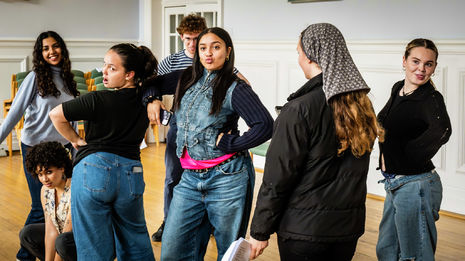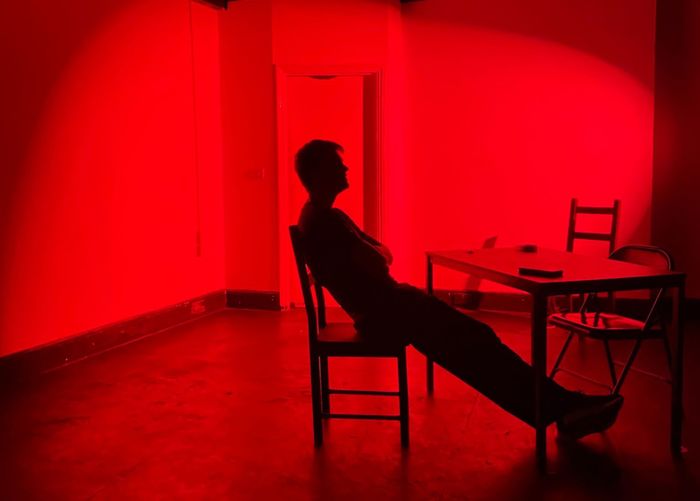The European Theatre Group preps for a tempestuous tour
Martha Vine covers the distance travelled by the ETG before they embark on their next dramatic expedition

“I've got facepaint in my pocket,” Manon Harvey announces as she drops into a booth at the Newnham cafe with a backpack and cycle helmet in hand – she’s just come back from a three hour lecture followed by a power walk to Grafton to source facepaint for the headshots that are going to be underway this week for the European Theatre Group. Manon Harvey, director of the Cambridge University European Theatre Group, and Jacob Gaskell, its tour manager, are busy people. The ETG demands a level of organisation unmatched by any internal Cambridge theatre: travelling across Western Europe to put on seven performances in two weeks, Gaskell has to get 24 Cambridge students in a coach on the 2nd of December that will drive to European schools, theatres, and universities with a production of The Tempest that’s been in the works since April. When I ask him how many miles they will cover, he laughs. “A lot.”
The ETG first started touring in 1957, the first group to go composed of half a dozen actors in two revamped fruit vans headed for Switzerland. It’s come a long way since then – Gaskell marvelled at the impossibility of its execution in a pre-email world, especially since so much of what the ETG does is “built on decades” of relations between schools, sponsorship companies and teachers. Re-establishing venue links post-pandemic proved tricky (CAST, the USA-touring Cambridge theatre group, had to cancel its first post-Covid trip), especially as ETG is, at its heart, an interpersonal project. “We’ve stayed everywhere,” Gaskell tells me. “Universities, host families, even a commune, once.” A few years ago one team slept on a barge in Amsterdam.
“Theatre becomes an immersive experience and a place of learning, not merely performance”
Clearly, the aim of the ETG is not just to put on a show. Alongside its performances, an educational pack is taken to schools so students can get a better understanding of the play before they see it live. Shakespeare isn’t always accessible, Harvey notes, and how much more so if English isn’t your first language? The ETG understands that the play must transcend the words on a script. “It’s hard, but it forces you to be innovative.” Performing on stages they haven’t seen before with a bare-bones technical set and an audience that may not exactly understand the dialogue is a catalyst for creating something deeply alive. Theatre becomes an immersive experience and a place of learning, not merely performance. Even the crew, not just the audiences, are learning as they go; four of the troupe are fresher techies, or ‘frechies,’ who’ve never worked on a production before and are trained up along the way. “It’s important to have that continuation,” Gaskell replies when I ask him why, on a performance that already takes so much organisation, they’d choose beginners to get involved. “That’s what theatre is. Letting people improve their skills.” In this way, the ETG has a familial feeling to it. Newcomers are welcomed and taught so that they can hopefully take over in the following years. One contact Gaskell reached out to about a performing space was an ex-ETG member himself; he turned up wearing his old merch. “Maybe that’ll be you someday,” I suggest. Gaskell smiles. He’s just excited to be “sitting on the coach on the second of December… and for it to leave.”
“There’s nothing to fall back on, no Cambridge executives to swoop in if something goes wrong”
The amount of thought that has gone into every element of their coming tour is tangible. Harvey chose to pitch The Tempest, a fascinating play, but a difficult one to stage; nothing can fly in, nothing can be projected, and for a work about the supernatural, she’s had to get creative. I wonder why she chose it; having laboured over this particular Shakespeare for the course of my A-Level exams, I know it will be no easy task to convey the wonders of a magical, secluded island filled with otherworldly inhabitants in a theatre halfway across the world that she’ll lay eyes on for the first time as she walks off the coach. Harvey thinks for a moment. “It’s a celebration of creativity. Creative forms.” The Tempest is filled to the brim with music, dancing, masques, and beautiful, lush verse. A “showcase,” she calls it. Not just a piece of art, but a question of why art is made – what purpose it fulfils.
Here, the purpose is evident. This tour of Shakespeare is an exploration, both of the words and of the response it elicits. The risks are pronounced, both Harvey and Gaskell agree. There’s nothing to fall back on, no Cambridge executives to swoop in if something goes wrong. But perhaps that’s why the ETG is doing something so important; “higher stakes,” maybe. After meeting Gaskell and Harvey, though, who have already given this their all for almost half a year, I get the feeling it will be a triumph.
 News / Proposed changes to Cambridge exam resits remain stricter than most7 May 2024
News / Proposed changes to Cambridge exam resits remain stricter than most7 May 2024 News / Cambridge students set up encampment calling for Israel divestment6 May 2024
News / Cambridge students set up encampment calling for Israel divestment6 May 2024 Features / Cambridge punters: historians, entertainers or artistes? 7 May 2024
Features / Cambridge punters: historians, entertainers or artistes? 7 May 2024 Sport / The ‘netball girl’: myth or reality?7 May 2024
Sport / The ‘netball girl’: myth or reality?7 May 2024 Theatre / A nuanced and neurodivergent Carrie comes to the ADC6 May 2024
Theatre / A nuanced and neurodivergent Carrie comes to the ADC6 May 2024






